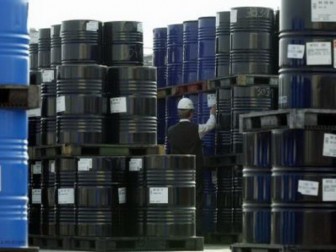 * China manufacturing picks up for first time in 13 months
* China manufacturing picks up for first time in 13 months
* U.S. fiscal deficit remains single biggest worry (Recasts, previous SINGAPORE)
By Shadia Nasralla
LONDON, Dec 3 (Reuters) – Oil held around $111 per barrel on Monday on signs China’s economic growth was beginning to recover, although gains were limited by concern about the economic welfare of the United States, the world’s top oil consumer.
Activity in China’s manufacturing sector quickened for the first time in 13 months in November, a survey of private factory managers found, adding to evidence of a pickup after seven quarters of slowing growth.
“China’s data has been broadly supportive of risk markets and entirely consistent with recent numbers suggesting overall improvement in growth,” said Ric Spooner, chief market analyst, CMC Markets in Sydney.
Brent futures were off 5 cents at $111.18 per barrel by 0952 GMT, after rising 2.3 percent in November. U.S. crude fell 19 cents to $88.72 per barrel.
U.S. crude futures are trading at around a $22 per barrel discount to Brent futures , narrower than the $25.5 discount seen in mid-November.
The gap is expected to remain wide as geopolitical risks will keep Brent elevated although U.S. prices may rise moderately due to an expected pick-up in demand, Credit Suisse analysts said in a report.
CHINA REVIVAL
The HSBC Purchasing Managers Survey (PMI), which focuses on private export-oriented manufacturers, rose to 50.5 in November, inching above the 50-mark that separates growth from contraction for the first time in 13 months.
Investors will now be awaiting China’s industrial output and trade data later this month for further confirmation of revival in the world’s biggest energy consumer.
Concern over the United States’ fiscal deficit and talks on the upcoming fiscal cliff, a $600 billion package of tax hikes and spending cuts which may plunge the world’s biggest economy into deep recession, kept oil price gains in check.
“It’s the main downside risk for prices as it could increase risk-aversion, push up the U.S. dollar and therefore weigh on commodities prices and also on oil prices,” said Carsten Fritsch, oil analyst for the Frankfurt-based Commerzbank.
The package takes effect at the end of the year and President Barack Obama’s administration and congressional leaders are trying to work toward a deficit reduction in the next session of Congress that begins in January.
Investors are also awaiting economic data from the United States, specifically on employment, to assess the health of the nation’s labour market. (Additional reporting by Ramya Venugopal in Singapore; editing by James Jukwey)
Source: Reuters


























